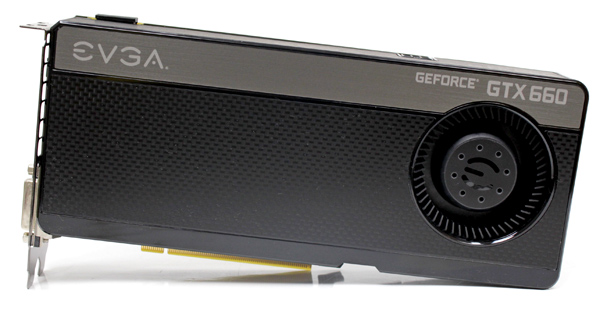Index
- EVGA GTX 650 Ti BOOST Superclocked reviewed
- Packaging
- A closer look at GTX 650 Ti Boost SC
- Testing methodology
- Nvidia Experience
- Crysis 3
- Crysis 2
- Far Cry 3
- Hitman Absolution
- Metro 2033
- Sleeping Dogs
- Dirt Showdown
- Aliens vs Predator
- 3DMark 11
- 3DMark
- Unigine Valley
- Unigine Heaven
- EVGA PrecisionX 4.0.0 & Overclocking
- Thermals, Noise and Consumption
- Conclusion
- All Pages
EVGA GTX 650 Ti Boost Superclocked uses dual-slot cooling that looks much like the GTX 660 Ti’s cooler. You have to look carefully to see differences between the coolers, especially if you want to compare it with the GTX 660 Superclocked. GTX 660 Superlocked and GTX 650 Ti Boost Superclocked feature a single 6-pin power connector. The cooler is a blower style affair and it’s two slots tall. No surprises here.



Nvidia limited the GTX 650 Ti Boost and GTX 660 to dual-card SLI, while faster cards in its lineup support triple SLI. In this price segment, this is a non-issue.

The standard GTX 650 Ti does not have an SLI connector or SLI support for that matter. The PCB is 17.3cm long while whole the card measures in at 24.3cm, which is clear once you look at the card from the back.

Nvidia did not put a lot of effort into reference heatsink design, so the heatsink only cools the GPU, leaving other low profile components exposed. EVGA’s card has a much better heatsink and cooler, borrowed from the GTX 660. The base clock on Boost Superclocked cards is higher than the reference clock, i.e. up from 980MHz to 1072MHz, but this didn’t prove too troublesome for the cooler.



The Samsung memory modules, K4G20325FD-FC03 are specified to run at 1500MHz (6000MHz GDDR5 effectively). EVGA’s GTX 650 Ti Boost Superclocked packs a total of 2GB of GDDR5, in eight memory modules. Four of the modules are placed on the back. The 192-bit memory bus, coupled with 6008MHz GDDR5, ensures plenty of bandwidth for the GPU. Additional memory would be overkill, since the GPU would give in to eye candy before the card runs out of memory.



The GTX 650 Ti BOOST has a single SLI connector, which is usual for this price segment. So, it’s possible to boost performance and use two cards in SLI mode, but not more than that. Video outs include two dual-link DVIs (only one is VGA capable), standard HDMI and standard DisplayPort connector. Note that all four outputs can be used simultaneously.


